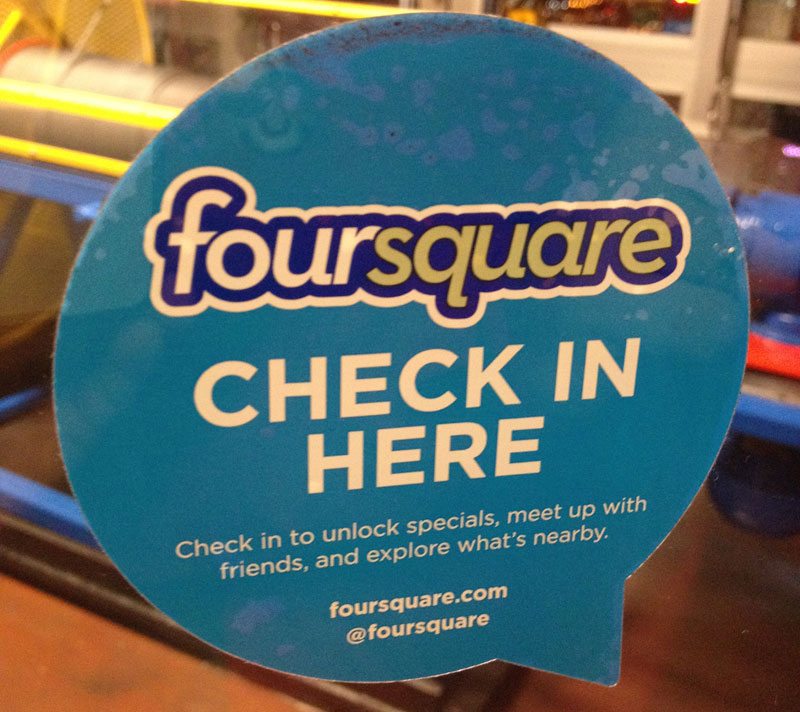Mobile Loyalty vs. Cellular Stalking
 I recently read an article in AdWeek that posed the question “Is the mobile check-in dead?” In my opinion I don’t think it’s dead yet, but it might be on life-support.
I recently read an article in AdWeek that posed the question “Is the mobile check-in dead?” In my opinion I don’t think it’s dead yet, but it might be on life-support.
And bad marketing along with boring retailers put it there.
Once the golden child and shining hope of effective experiential and social affinity marketing, check-in apps seemed to have lost their luster after no single brand emerged as the category leader. Instead they all seemed to multiply like bunnies, with more apps begetting and begatting than all those names in the early chapters of the Old Testament.
I really thought Foursquare had it locked-up.
They were the first and best (and most fun). Foursquare’s achievement badges and “Mayor” status for the places you visited more than anyone else set the bar incredibly high for any other apps who wanted to take the top spot away from them. They even provided tools and admin accounts to allow super-users to help keep listings accurate, update, and eliminate duplicate locations; as well as providing the means for retail establishments to offer their own check-in specials to users (at no cost to the retailer.) I think Foursquare’s focus was to grow the user base high enough to sell over-arching sponsorships to larger companies (I saw several Amex campaigns) or to create a paid tier structure to retailers offering specials.
Yelp soon attempted to ride Foursquare’s coattails by adding location check-in to their core review posting tool, but they lacked the fun and innovation and came off as a bad copy.
Best positioned to win the crown would have been Facebook. They had the existing user base, and when they unveiled Facebook Places I really thought it might result in Facebook buying Foursquare for their fun and engaging gamification execution — but they didn’t. Facebook Places remained dull and unengaging and people just kind of stopped using it.
Sadly, retailers never really came around to using the tools provided by Foursquare — and that is Foursquare’s fault.
 If Foursquare had held free, local, business building seminars in some of their most promising cities they could have won retailers and restaurants as users by helping them succeed using Foursquare’s tools (and earned themselves client testimonials and success stories while they were at it) which would have won new users into the fold. Instead, Foursquare just seemed to watch their user base atrophy and use their tools less and less.
If Foursquare had held free, local, business building seminars in some of their most promising cities they could have won retailers and restaurants as users by helping them succeed using Foursquare’s tools (and earned themselves client testimonials and success stories while they were at it) which would have won new users into the fold. Instead, Foursquare just seemed to watch their user base atrophy and use their tools less and less.
Out of the blue the folks at Foursquare seemed to launch a new app that solved a problem no one had. Instead of winning users back and breathing excitement back into their core product, they created new app called Swarm that appeared to be a check-in only app (no reviews, no rankings, no badges, and no Mayors!) It wasn’t fun. It wasn’t engaging. It was Facebook Places without your Friend base. And then they relaunch Foursquare itself — and I defy anyone to tell me the current purpose of that app.
I was a super-user on the original Foursquare. I had editing and admin access. I held Mayor status at more than 5-10 places at any given time. As Foursquare stopped engaging me (fewer badges, fewer check-in specials), my use of the app declined. When the new Swarm launched I tried it — but it lacked sting. When the new Foursquare app launched and I couldn’t figure out the point of having both apps, I simply ended up deleting both the new Foursquare and Swarm from my phone. I didn’t stop checking-in because I didn’t like it — I stopped because it became boring.
If you read the AdWeek article you’ll see that advertisers are getting more excited about being able to “stalk” mobile users via their GPS and using old-school uninvited and interruption-based advertising by blasting people with a message when they get within a certain distance of their stores. At least with Television, Print, and Radio the ads can have a reciprocal feel (we watch, read, or listen to content and in exchange they can push an advertisement at us), but these cellular stalking ads are completely unbidden. Ironically, many of these ads and offer would have been welcomed had they been shared with us after we checked-in via Foursquare (et al.), the most loyal and active of their consumers — but they’ve decided to forsake the loyal local Foursquare individuals for the appealing-to-advertisers mass audience (which will find these obnoxious and interrupting messages anything but appealing.)
If anyone out there is connected to the folks at Foursquare, I hope you’ll share this article.
I’d love to share some ideas with them.
I believe Foursquare could still make a comeback, but it’s going to take work and a willingness to admit a mistake and move back two squares in order to move forward four squares.
.



